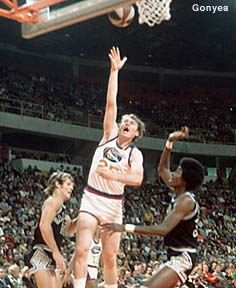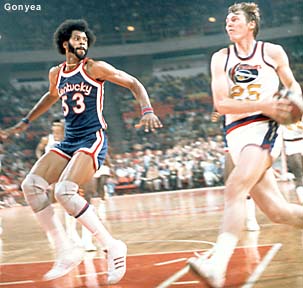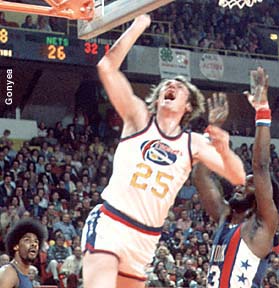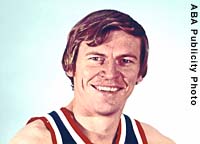Dan: How are you?
Brett: Ah, very good. How are you?
Doing well, thank you.
It’s sort of a tough day out there.
Yeah, yeah.
Well, as I had said earlier, I was just looking to talk a little bit about your time in the ABA, and less the anecdotal stuff that we see a lot of, but really a little bit more of its impact of on the current NBA, et cetera.
Mm hmm…
First of all, at the time, what did you think of the ABA? You had a choice. Did you ever wish you could be an NBA player? Did you look at it as if it was a—was there an inferiority complex?
 Well, as you said, I did have a choice. I chose the ABA primarily because it was in Kentucky. I was originally drafted by the Dallas franchise, and I told them that only team I would even consider playing for in the ABA was the Kentucky Colonels. So about a week later the Kentucky Colonels had my draft rights (laughing). That was the primary reason. To be able to stay in Kentucky.
Well, as you said, I did have a choice. I chose the ABA primarily because it was in Kentucky. I was originally drafted by the Dallas franchise, and I told them that only team I would even consider playing for in the ABA was the Kentucky Colonels. So about a week later the Kentucky Colonels had my draft rights (laughing). That was the primary reason. To be able to stay in Kentucky.
To be honest, there probably was a little bit of an inferiority complex because we didn’t get the coverage. Of course, neither league got the coverage that professional basketball gets today, but very few of us, we didn’t have a national TV contract. So I guess there was a little bit of a feeling like that, but I think everybody that was playing in the ABA, especially the last four or five years, knew that we were playing as good a basketball as they were in the NBA, and that was certainly substantiated with the success of the ABA teams once the merger took place.
I guess it’s interesting to talk to you here and now, in that our "mother" publication was Basketball Weekly, which was probably one of the few media outlets to give some pretty fair coverage to the ABA…
Exactly.
…so that’s sort of interesting. You were—I’ve read to this effect—when you were traded, and/or sold to Denver, I know you had some mixed feelings there, but I guess that’s worked out for you.
Absolutely, absolutely. Again, after playing four years at the University of Kentucky and five years with the Colonels and having just won the ABA Championship, I thought I was going to be in Kentucky for the rest of my career, and there certainly were some hard feelings when I was sold, first to the Baltimore Claws, and then to Denver. But a year later, there was no ABA, there was no Kentucky Colonels, and I was in a pretty good spot.
I have to interject from what some of my standard questions are to sort of throw a little personal thing in here. I’m looking up right now at my red, white and blue Artis Gilmore-model ABA ball (Issel laughs). Can you tell me a little bit about playing with Artis, I know he’s sort of a quiet guy, certainly not in the limelight, but a huge, huge ABA player.
 Yeah, and you know, the one thing that Artis did, about the only team that had what you would call a legitimate professional center was the Indiana Pacers, with Mel Daniels, and that’s why I think the Pacers were so successful in the ABA. But Artis coming along kind of forced the rest of the teams to start getting some big people that played that kind of style, that the NBA played. Up until then—and the ABA was certainly always more wide open and an up-and-down league than the NBA was—but Artis was an unbelievable basketball player, and he was Rookie of the Year in a year when George McGinnis and Julius Erving were rookies. He was just an awesome player, and just another step that really gave the ABA some credibility.
Yeah, and you know, the one thing that Artis did, about the only team that had what you would call a legitimate professional center was the Indiana Pacers, with Mel Daniels, and that’s why I think the Pacers were so successful in the ABA. But Artis coming along kind of forced the rest of the teams to start getting some big people that played that kind of style, that the NBA played. Up until then—and the ABA was certainly always more wide open and an up-and-down league than the NBA was—but Artis was an unbelievable basketball player, and he was Rookie of the Year in a year when George McGinnis and Julius Erving were rookies. He was just an awesome player, and just another step that really gave the ABA some credibility.
My basketball fandom, it’s funny that I’ve become such a fan of the ABA, I started right as the merger happened. I never got to see the ABA in person, or really any coverage of it, but it was because Artis Gilmore was, essentially, sold to the Bulls, and he was my first hero. I guess in a way I have to be thankful for all of that happening. But now I look up and I’ve got the red, white and blue sitting up there…
You got it.
What are the most significant contributions the ABA made to pro basketball when you look back on it?
Well, I think I just touched on one. Of course, the ABA was where the 3-point line started.
Certainly.
I think that that has had a major impact on all of basketball, not just professional basketball, but all of basketball. So I think that would be the most significant.
And I think the other thing is the fact that we were able to get such young stars as McGinnis, and Julius, and George Gervin, was because in those days the NBA wouldn’t accept anybody whose college class had not yet graduated. Especially now, when you have high school kids coming into the NBA—I don’t happen to agree with it, I don’t think it’s a good idea—but I’d say that was a significant impact that the ABA had on the NBA as well, because the NBA had to start accepting underclassmen.
Oh, no doubt. In terms of lasting impact, for better or worse, what would you list as something the ABA has impacted on today’s NBA, now 30 years later?
Mmm…I think it’s positive, although it has gone back a little bit. Prior to the ABA, the NBA was just a walk-the-ball-up-the-floor, and try to pound it inside to the big guys. It wasn’t a very entertaining brand of basketball, and I think that although we’re getting more back to that style, it’s still the wide-open style and the 3-point shot that I think really helps the athletes today show off their talents. That’s why basketball is such an entertaining sport today.
There is a bit of resurgence in terms of interest, I’m not sure if you just chalk it up to nostalgia or not, but why do you think fans, especially someone like myself, who never got to really see this "hidden" league, find it so compelling?
Well, I think because it was something different. It was kind of a renegade league with its own brand of characters, but I think the biggest reason is that we just remember the good things, we don’t remember the bad (laughing) things…
Yeah, the unpaid bills… …we don’t remember that once [Nuggets GM] Carl Scheer had to come to downtown Denver and pay the Virginia Squires’ hotel bill or they were going to lock them all up. We don’t remember things like that, we just remember the great basketball players that came out of the ABA.
Yeah, probably not fun to revisit times you were wondering whether your paycheck was going to bounce or not.
(Laughing) Yeah, that’s right. The story goes that everybody in Virginia went out and bought fast sports cars because only about the first three guys that got to the bank had their checks clear.
It paid to be quick, huh?
That’s right.
What does the—certainly speaking now from well inside the NBA—what would you say the state of professional basketball is today?
It certainly is entertaining, and in the plus category, players are so much more talented today. The size of some of these guys, and the way they can run up and down the floor, is just marvelous.
I would say negatively, not a lot of players coming in today really understand how to play the game of basketball. But it will always be fun to watch, because for me, anyway, we’ve got the greatest athletes in the world playing our sport.
What innovations would you like to see in the NBA? Does it take a second league to provide some of the innovation the ABA ended up providing?
Well, it might, because when you’re in a comfortable position, much like the NBA was before the ABA came along, status quo, you don’t really change with the times. When you have a new league come in that is innovative, that isn’t afraid to do things differently, sometimes that brings it along. I don’t know.
As far as innovations are concerned, one thing they might have to consider is making the court larger because the players are so athletic. I don’t think you want to raise the rims, because that would take away the dunk shot, which I think is probably one of the more entertaining plays in basketball. But the space that Dr. Naismith came up with was basically for a bunch of slow guys walking the ball up the court…
Yeah, peach baskets…
(Laughing) Yeah. As the athletes get bigger, stronger and quicker, you may have to enlarge the playing area.
What’s the one thing looking back at the ABA, and being entrenched in the NBA now, that you miss?
The camaraderie, that’s easy. The camaraderie.
Us against them?
Yeah. You played teams so often that you really got a chance to know the guys on the other team, and although we certainly competed---there was a fight a night in the ABA—you don’t get to develop those kinds of relationships anymore because even the teams that you’re playing against most often in your own conference you’re only seeing four times a year. So yeah, the camaraderie was really a lot of fun.
 |
I’ve got a photo of you from those days we’re going to consider running along with the article here in a couple of weeks, and it looks to me—as you said, there’s a fight a night in the ABA—I don’t know if it’s just the angle or not, but it appears as if you’ve had some teeth knocked out. Did that happen in the ABA, or am I…
No no no, that happened long before. That happened in junior high school. I just didn’t play with it.
I appreciate a little bit of the ABA insight and getting caught up to date. Congratulations, a really terrific turnaround and a really promising team you’ve got there.
Thank you. I appreciate that. Any time.
Thank you very much, Dan.
OK, bye-bye. |
 To be honest, Dan Issel was sort of a last-minute addition to my "wish list" to talk to about the ABA. I don't understand why I'd overlooked him until the last minute -- he's another person who provided terrific perspective on both the "old" ABA and the "new" NBA, and as the ABA's second all-time leading scorer, he's much more than a "fringe" alum of the league. I spoke with Dan in Denver on the afternoon of the Columbine killings, which lent a bit of distraction to the interview. It was a tough day.
To be honest, Dan Issel was sort of a last-minute addition to my "wish list" to talk to about the ABA. I don't understand why I'd overlooked him until the last minute -- he's another person who provided terrific perspective on both the "old" ABA and the "new" NBA, and as the ABA's second all-time leading scorer, he's much more than a "fringe" alum of the league. I spoke with Dan in Denver on the afternoon of the Columbine killings, which lent a bit of distraction to the interview. It was a tough day.